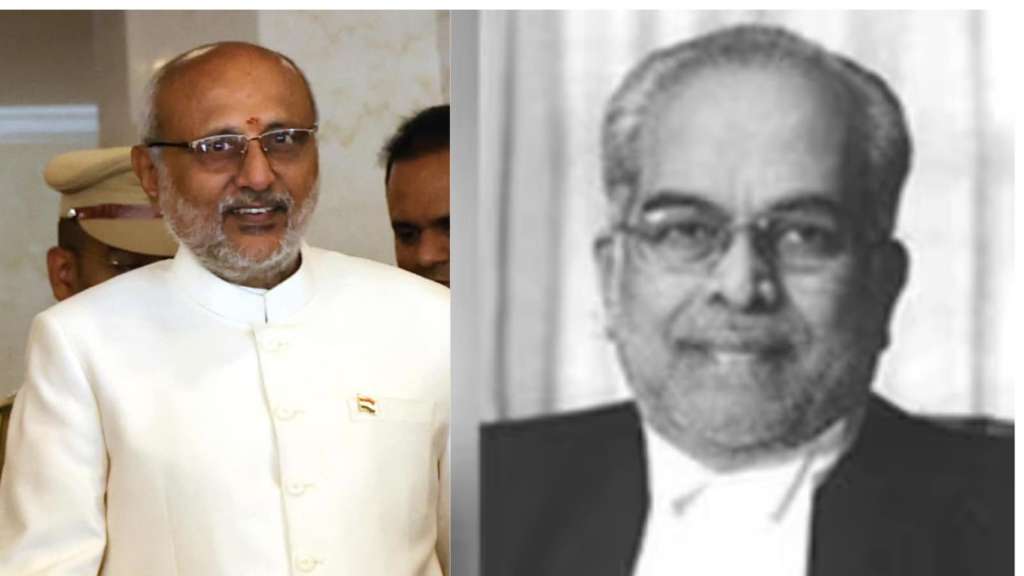ONE MONTH after the resignation of Vice-President Jagdeep Dhankhar, elections for the post are underway in Parliament on Tuesday.
The voting will take place until 5 pm, with counting beginning an hour later.
The numbers stack up in favour of National Democratic Alliance (NDA) candidate and Maharashtra governor C P Radhakrishnan. Former Supreme Court judge Sudershan Reddy is the opposition bloc INDIA’s nominee.
The electoral college for the V-P election currently comprises 781 MPs — 239 members of the Rajya Sabha and 542 members of the Lok Sabha. The NDA has 425 MPs in its camp where the BJP itself accounts for 342 members in both the Houses. The Opposition camp has 324 MPs, with the Congress having 126 members. The YSRCP’s backing would increase the NDA’s tally.
With the Bharat Rashtra Samithi (BRS) and the BJD (Biju Janata Dal) opting to abstain, the electoral college is set to come down to 770 votes, with the majority mark being 386.
C P Radhakrishnan
The arc of his political life reaches back to his teenage years. Born in Tiruppur in western Tamil Nadu, Radhakrishnan joined the RSS at the age of 16 and rose steadily through the BJP’s ranks. In 1998 and 1999, he won the Coimbatore Lok Sabha seat with commanding margins, which were the highest in the state at the time. His success in western Tamil Nadu, long a challenging terrain for the BJP, gave him both credibility and clout within the party as well as the RSS. He eventually went on to serve as the party’s Tamil Nadu president from 2004 to 2007 and also became a National Executive member of the BJP. He became Jharkhand governor in February 2023 and moved on to Maharashtra in February 2024.
Colleagues often describe him as a man steeped in the Sangh Parivar’s ideological framework, yet pragmatic in execution. His straightforward demeanour, combined with a relatively clean image, set him apart in a political culture often marred by personal rivalries and corruption scandals.
Yet, Radhakrishnan has not shied from controversy. When Tamil Nadu minister Udhayanidhi Stalin called for the “annihilation” of Sanatan Dharma in 2023, Radhakrishnan, though the Jharkhand Governor at the time, countered sharply, warning that those who tried to destroy Hindu traditions “will perish by their own act”. He dismissed Udhayanidhi as “a child” dabbling in matters beyond his depth, drawing attention from both admirers and detractors.
His elevation as Governor earlier had coincided with the then BJP state president K Annamalai’s efforts to consolidate influence in Coimbatore and the wider Kongu belt, a signal that the party valued Radhakrishnan’s politics even as younger leaders were being pushed into the same space.
Sudershan Reddy
Justice Sudershan Reddy, who retired in 2011, will be the first former Supreme Court judge to contest an election for the post of Vice-President.
In 1979, former Chief Justice of India Mohammad Hidayatullah was elected the Vice-President by a consensus among different parties. He was briefly the acting President in 1984. In 1982, former SC judge Justice H R Khanna contested for the office of President and lost to Giani Zail Singh.
Justice Reddy, 79, was born on July 8, 1946, in the village of Akula Mylaram in Ranga Reddy district, on the outskirts of Hyderabad. He graduated from Osmania University in Hyderabad in 1971 and began practising law in the High Court of Andhra Pradesh, serving as the government pleader, and was later elected president of the AP HC Advocates Association. In 1993, he was appointed a judge of that court and in 2005, became the Chief Justice of the Gauhati High Court. He was elevated to the Supreme Court in January 2007.
During his five-year tenure in the top court, Justice Reddy heard several constitutional cases. His most consequential judgment was the celebrated Nandini Sundar versus State of Chhattisgarh in 2011 in which the top court banned the Salwa Judum militia, directing that the practice of using tribal youth as Special Police Officers to counter the Naxal insurgency be brought to an end.
This judgement became a topic of discussion after Justice Reddy was picked as VP candidate. Union Home Minister Amit Shah said “Naxal terrorism would have ended by 2020” had Justice Reddy not given the verdict. BJP MP Ravi Shankar Prasad joined in to say the verdict reflected Reddy’s “inclination towards Maoism”.
In an interview with The Indian Express, the former Supreme Court judge denied the allegations, saying the State has the right to combat violence but “cannot infringe upon fundamental rights”.
In 2011, Justice Reddy was also part of the top court Bench that termed the money secreted away in foreign banks as “proceeds of pure and simple theft” and dared the Centre to stop it from holding a general inquiry, in public interest, into the government’s investigations into Indians who have parked “gigantic amounts plundered from national economy” in tax havens across the world.
Upon retirement, in March 2013, he was appointed the first Lokayukta of Goa, but he resigned in just seven months, citing personal reasons. In 2022, the Supreme Court appointed him as an “oversight authority” to ensure that the mining operations in Karnataka follow the Comprehensive Environmental Plan for Mining Impact Zone, a project to restore land in districts such as Ballari, Chitradurga, and Tumakuru affected by rampant mining.

